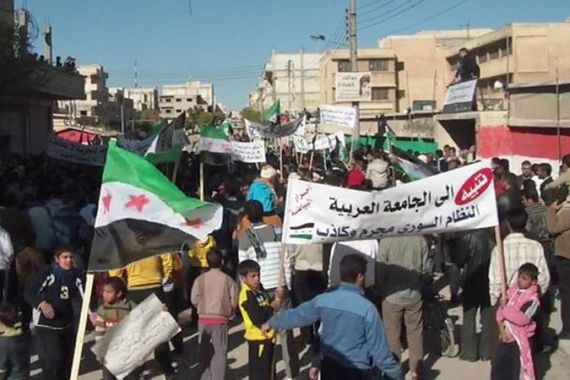International pressure mounts on Syria
EU expected to widen sanctions as the world’s largest Islamic body calls on Syria to “stop using excessive force”.

International pressure is mounting on the Syrian government to stop its crackdown on dissent, with the European Union expected to expand its sanctions against the country’s oil sector.
Diplomats said a decision to add the state-owned General Petroleum Corporation, along with several other Syrian firms, to the list of sanctioned companies was expected on Thursday.
Measures could also be taken to ban selling of software that could be used to monitor internet and telephone communications.
Arab League chief Nabil al-Araby joined EU foreign ministers for talks in the Belgian capital, Brussels.
EU foreign policy chief Catherine Ashton said she was “very pleased” with the unprecedented sanctions that the Arab League slapped on Syria last weekend.
EU ministers and al-Araby would try to determine “the best and most appropriate ways that we can collaborate,” she said.
‘Excessive force’
The world’s largest Islamic body on Wednesday urged Syria to “immediately stop using excessive force” against citizens, to avert the threat of foreign intervention.
The Organisation of Islamic Co-operation (OIC) also urged Syria to co-operate with the Arab League, which has imposed unprecedented sanctions on Damascus.
In a statement released after the group’s meeting in Saudi Arabia, the OIC urged “all parties in Syria to renounce violence and resort to peaceful means”.
Separately, an Arab League committee overseeing the sanctions has listed 17 people banned from travel to Arab states, including President Bashar al-Assad’s brother, Maher, Egypt’s state news agency said on Thursday.
The list also included the defence and interior ministers, intelligence officials and senior military officers.
The committee recommended stopping flights to and from Syria starting mid-December and also recommended exempting wheat, medicine, gas and electricity from the ban on trade with Syria’s government, the agency reported.
Further tightening regional pressure, Turkey has said it will suspend all financial dealings with Syria and freeze the assets of Assad’s government.
Ahmet Davutoglu, the Turkish foreign minister, said on Wednesday that Assad’s government had come “to the end of the road”.
He said Turkey will block the delivery of all weapons and military equipment to Syria.
“Every bullet fired, every bombed mosque has eliminated the legitimacy of the Syrian leadership and has widened the gap between us,” Davutoglu said. “Syria has squandered the last chance that it was given.”
‘Economic war’
Syria’s government has said the Arab League declared an “economic war” when it decided to impose sanctions.
Adnan Mahmoud, the country’s information minister, said the cabinet looked at several measure to cope with the impact of sanctions.
He said Syrians should not fear shortages in basic commodities.
|
|
“The government reiterates its commitment to secure the provision of the needs of Syrian citizens with the existence of self-sufficiency and a strategic stockpile of basic commodities and food, which should assure the people and push away their fears of lacking any commodity from the markets,” he said.
Mahmoud said Syria would also look to “friendly” markets that are not affected by the “American and Western” policies.
On the ground in Syria, the international criticism seemed to have little effect as violence continued on Wednesday.
Seven Syrian soldiers were killed by army renegades and six civilians were shot dead, according to the UK-based Syrian Observatory for Human Rights.
The group said clashes erupted in the southern town of Dael when security forces moved in during the early morning, and continued well into afternoon.
“Two security force vehicles were blown up. Seven [troops] were killed,” Rami Abdel-Rahman, head of the observatory, said.
In the north of Syria, at least six civilians were shot dead when security forces broke up an anti-government demonstration in the city of Idlib, he said.